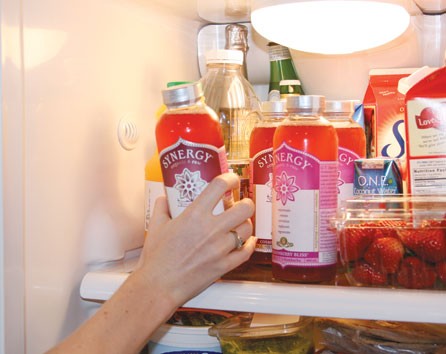
Kombucha is predominantly sold individually in markets like Central Market, Whole Foods and other smaller health stores, setting for around $3 for a 16 ounce bottle. (KATIE TUFTS/The Daily Campus)
When students are looking for a drink to wake them up in the morning or afternoon, Kombucha, a Chinese fermented tea, is not what most grab out of the refrigerator.
But it may be just what they need.
Though the FDA has not tested or regulated the effects and benefits of Kombucha, the sour-tasting tea has been known, through personal testimonials and animal studies, to provide numerous health benefits. These include increased energy and metabolism, improved digestive and immune functions.
Kombucha is said to contain probiotics and antioxidants that increase immunities in the body to help fight sickness.
Kombucha has been around for decades in Russia and China, but it only came to the United States recently.
Since the 19th century, it has been promoted as an immunity-boosting tea, according to cancer.org.
The drink is made through a fermentation process that lasts about 10 days. Colonies of cultured yeast or bacteria are added to sweetened tea.
The tea then ferments to a low pH and the liquid is taken and bottled to drink.
The sour taste comes from the fermentation, and some have a small amount of fruit juice added to the drink to make different flavors.
Also, small colonies of probiotic cultures float in the juice. This can be a turn off to some, but others can’t get enough of the unique drink.
The hype about Kombucha has traveled to the U.S., but many people question the benefits of the drink.
The science community is uncertain if the drink is helpful or if it can actually be harmful. There is worry about contamination and the harmful bacteria that can grow during the fermentation process, as well as other adverse effects, according to the Mayo Clinic.
Because of this, few commercial growers have entered the Kombucha market in the U.S., leading many people to start making their own tea.
The Internet acts as the marketplace for growers around the country to share recipes and ideas about brewing their own tea.
Ed Kasper started the happy herbalist website to promote safe and healthy brewing of Kombucha tea.
Websites like happyherbalist.com give recipes and tips on how to make Kombucha as well as sell the products needed for every step.
With the small commercial market, these websites have allowed small, individual brewers to buy the ingredients necessary to making the tea online.
Additionally, they are able to find the best techniques and process to make their cultures and tea.
There is one main commercial Kombucha maker that is prospering in the business. GT’s Kombucha, made by Millennium Products, leads the Kombucha market.
GT started the company out of the kitchen of his parent’s house, without a plan, just the desire to spread the fermented tea that helped to slow his mother’s cancer, according to the GT website.
GT’s purpose with his Kombucha production is to give people, “100 percent raw and organic.” According to the GT website. “Kombucha nourishes the body, delights your taste buds, bolsters your immunity, and makes your spirits fly. You feel on top of the world. Healthier. Happier. Stronger. It is living food for a living body.”
However, the sour, vinegar taste may not delight all taste buds and will actually keep some consumers away as it is literally hard to swallow.
“I’ve tried Kombucha, and I think it tastes like vinegar. I’ve heard so much about how good it is for you, but I just can’t bring myself to actually drink it,” junior Stephanie Collins said.
“The most horrific part is that stuff that floats in it. It’s supposed to be some kind of health miracle, but until I’m desperate, I’m sticking to my plan of avoiding it at all costs,” she said.
Collins’ sister, Lisa, feels differently about the juice. Once getting past the taste, some see benefits to drinking Kombucha.
“I really like the taste of vinegar which is weird, but I love Kombucha. It makes you feel so good,” senior Lisa said, adding that the raspberry flavor is her favorite.
At only around 30 calories per one eight-ounce serving, the drink can act as a good substitute for sugary energy drinks or coffee. Both of these are both high in caffeine and also carry loads of sugar and calories.
Alternatively, Kombucha is high in vitamins and good bacteria.
Kombucha is mainly sold individually in markets like Central Market, Whole Foods or other smaller health stores and sells for around $3 for a 16 ounce bottle.
Though the cultured tea is gaining popularity in the U.S., it is still relatively unknown, and many have still yet to catch on.
“I’ve never tried it, but I’ve heard that it’s really good for you,” junior Ali Grace said.








